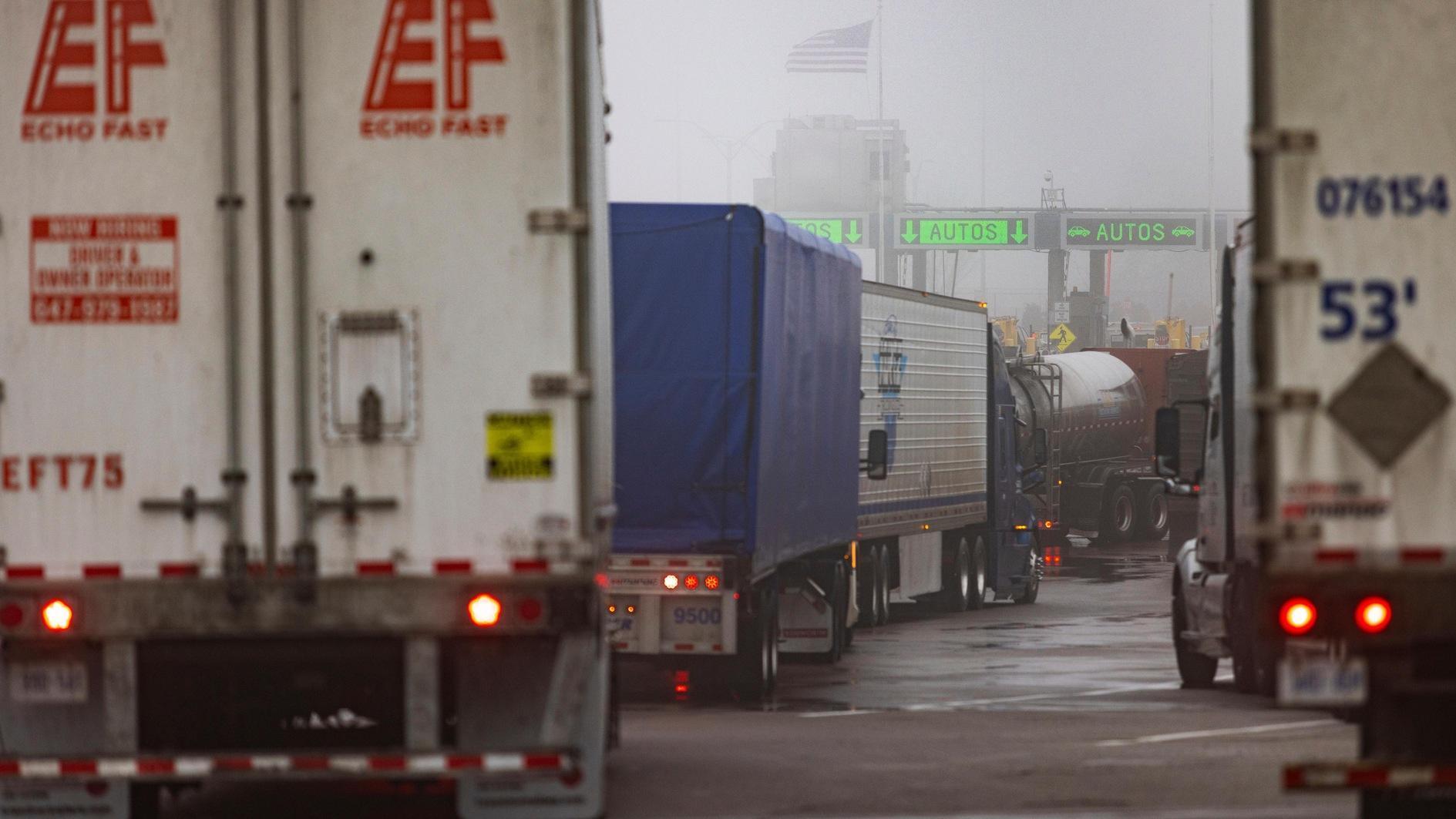
Trucks wait to cross the United States border on the Peace Bridge, Thursday, Feb. 27, 2025.
Mounting trade wars between the United States and its largest economic partners deepened on Tuesday as U.S. tariffs on Canada, Mexico and China kicked in, sparking swift retaliation from Beijing and Ottawa.
Steep U.S. tariffs on Canadian and Mexican goods came into effect as a deadline to avert President Donald Trump's levies passed without the nations striking a deal, in a move set to snarl supply chains.
Trump had unveiled — and then paused — blanket tariffs on imports from major trading partners Canada and Mexico in February, accusing them of failing to stop illegal immigration and drug trafficking.
In pushing ahead with the duties, Trump cited a lack of progress in tackling the flow of drugs like fentanyl into the United States.
U.S. stock markets tumbled Monday after Trump told reporters there was "no room left" for the North American neighbors to avoid the levies.
The duties stand to impact over $918 billion worth of U.S. imports from both countries.
Trump also inked an order Monday to increase a previously imposed 10 percent tariff on China to 20 percent — piling atop existing levies on various Chinese goods.
China on Tuesday vowed to fight to the "bitter end" if the United States pushes a trade war.
China said it would slap fresh tariffs on a range of agricultural imports from the U.S. as of next week, in retaliation against the hike in levies by Washington.
"An additional 15 percent tariffs will be imposed on chicken, wheat, corn and cotton," Beijing's finance ministry said, adding "additional 10 percent tariffs will be imposed on sorghum, soybeans, pork, beef, aquatic products, fruits, vegetables and dairy products".
"If the United States... persists in waging a tariff war, a trade war, or any other kind of war, the Chinese side will fight them to the bitter end," foreign ministry spokesman Lin Jian said.
Economists caution that tariffs could raise consumer prices while weighing on growth and employment.
Asian markets fell on opening Tuesday, with Japan's Nikkei index dropping more than two percent and Hong Kong's Hang Seng down 1.5 percent after Trump's latest tariff actions.
The Tax Foundation estimates that before accounting for foreign retaliation, tariffs on Canada, Mexico and China this time would each cut U.S. economic output by 0.1 percent.
And sweeping duties, particularly on Canada and Mexico, are set to upset supply chains for key sectors like automobiles and construction materials, risking cost increases to households.
This could complicate Trump's efforts to fulfill his campaign promises of lowering prices for Americans.
On Monday, Trump told reporters that Canada and Mexico should "build their car plants, frankly, and other things in the United States" in order to face no tariffs.
Former U.S. officials see Trump's tariffs over drugs like fentanyl as a means to tackle socio-economic problems — while providing legal justifications to move quickly.
Washington is also seeking leverage and to rebalance trade ties, analysts say.
But using emergency economic powers to impose tariffs on Canada, Mexico and China is a novel move, and could trigger lawsuits.
'Existential threat'
Canadian Prime Minister Justin Trudeau on Monday pledged to impose retaliatory 25 percent tariffs on Washington, saying in a statement: "Canada will not let this unjustified decision go unanswered."
Mexican President Claudia Sheinbaum said her country has contingency plans.
If Trump continues with his tariff plans, KPMG chief economist Diane Swonk warned ahead of them going into effect: "We could easily reach the highest effective tariff rate since 1936 by the beginning of 2026."
Both consumers and manufacturers stand to bear the costs of additional tariffs, which could diminish demand and trigger layoffs as businesses try to keep costs under control, she told AFP.
Robert Dietz, chief economist at the National Association of Home Builders, told AFP the group expects a possible "combined duty tariff rate of above 50 percent on Canadian lumber" as proposed duties add up.
Even as the United States also plans to expand forestry, Dietz said, prices will likely rise in the short-run.
Anecdotally, some builders expect they could face higher costs of $7,500 to $10,000 per newly built single family home, he said.
Industry pushback
Trump's doubling down on tariffs has already drawn industry pushback.
The U.S.-China Business Council, a group of around 270 American firms that do business in China, warned in a statement that sweeping tariffs would hurt U.S. firms, consumers and farmers "and undermine our global competitiveness."
"Any use of tariffs should be strategic and targeted, focusing on specific U.S. national security goals and unfair Chinese economic practices," the council's president Sean Stein said.
The National Retail Federation, meanwhile, warned that as long as tariffs on Canada and Mexico are in place, "Americans will be forced to pay higher prices on household goods."
While Washington has targeted China over chemicals for illicit fentanyl, many of the components have legitimate uses, too — making prosecution tricky.
Trudeau has said that less than one percent of the fentanyl and undocumented migrants that enter the United States come through the Canadian border.